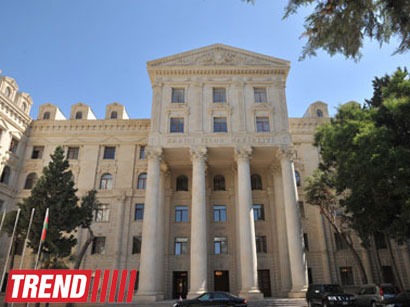Baku, Azerbaijan, Nov. 3
By Seba Aghayeva - Trend:
The principle of self-determination of peoples is one of the highest principles in international law, said the acting head of the press service of Azerbaijan's Foreign Minister Hikmet Hajiyev Nov. 3.
He was commenting on the Armenian Foreign Minister Edward Nalbandian's statements on the principle of self-determination of peoples.
Hajiyev said the politicization of international law, in particular the principle of self-determination of peoples, and its usage for political speculation is unacceptable.
"Unfortunately, we are witnessing such a practice on the part of Armenia," he added.
Hajiyev noted that in the UN charter the right of peoples for self-determination refers to the non-self-governing and the occupied territories, struggling against the colonization.
He said the 1975 Helsinki Final Act states that the participating states will respect the equal right of peoples to self-determination, acting at all times in accordance with the purposes and principles of the UN charter and relevant norms of international law, including those relating to territorial integrity of states.
The acting head of the ministry's press service also said that, apparently, the self-determination should not contradict the UN charter and territorial integrity.
"Regarding the territorial integrity, the Helsinki Final Act says that the states shall not directly or through violence and military aggression appropriate the territory of another state. This document also states that such aggression or appropriation of the territory will be considered illegal," Hajiyev said.
He went on to add that amid the occupation and aggression of Armenia against Azerbaijan, as well as ethnic cleansing, it is inappropriate to talk about the right to self-determination.
"These actions of Armenia are contrary to the fundamental principles, the essence and philosophy of the right for self-determination of peoples," Hajiyev said.
"Edward Nalbandian either does not know this, or he is deliberately turning the principle of self-determination of peoples and international law into the object of political speculations, which is unfortunate," he added.
The conflict between the two South Caucasus countries began in 1988 when Armenia made territorial claims against Azerbaijan.
As a result of the ensuing war, in 1992 Armenian armed forces occupied 20 percent of Azerbaijan, including the Nagorno-Karabakh region and seven surrounding districts.
The two countries signed a ceasefire agreement in 1994. The co-chairs of the OSCE Minsk Group, Russia, France and the US are currently holding peace negotiations.
Armenia has not yet implemented four UN Security Council resolutions on the liberation of the Nagorno-Karabakh and the surrounding regions.
Edited by CN






